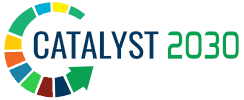Many, many people, organisations and initiatives are focused on addressing today’s critical social-political-economic-environmental knots of problems. A common lament from those doing the change is a lack of finance; those doing the finance complain of a lack of product. Looking at the latest developments, a new report:
- Distinguishes between “progressive capital” such as ESG and impact investing and “transformation capital” as a distinct, emerging field. The former is characterised as reform-oriented within the current power structures, and the latter as transformations-focused with a “liberatory power” approach. Such power emphasises power sharing equitably.
- Concludes the challenge requires developing ecosystems for financing transformation (EFTs) that can create new on-going flows at scale based on new action logics, values, relationships and power arrangements. This approach contrasts with piecemeal solutions, such as developing new mechanisms like Green Bonds; modifying existing strategies with approaches like impact investing and Environmental-Social-Governance (ESG) mandates; and assembling new funds from groups like foundations, investors and governments.
- Identifies four such ecosystems in operation and another half dozen at various stages of development.
The report concludes by identifying specific actions to accelerate development of EFTs.
EFT Report launch Webinar
An Investigation into Transforming Finance, explores the characteristics of transformation finance field that are distinct from progressive finance.
Join us on the 15th of July 2021 for a lively discussion with several innovators in the emerging field of Transformation Finance. This engaging 60 minute introduction to the report results, discussion, and exploration of next steps will be opened by Tim Hanstad of the Chandler Foundation and moderated by Dana François of the W.K. Kellogg Foundation.
François’ contribution to the report included her expertise identifying and advancing systemic change within communities, leading to viable solutions for economic development, with a focus on Haiti. She will interview Neelam Chhiber, Sylvia Bastante de Unverhau and Dominic Hofstetter, all thought leaders in the emerging field and contributors to the report.
Learn more about the stellar co-presenters

Tim Hanstad
Tim Hanstad serves as CEO of the Chandler Foundation, where he oversees the organisation’s vision to champion prosperity and expand economic opportunity for all. Previously, he co-founded Landesa and served as its CEO. Landesa became the world’s leading land rights organisation and was ranked among the top 10 nongovernmental organisations globally by NGO Advisor. Tim launched Landesa’s programs in China, the former Soviet Union, and India – where he lived for many years. As a Skoll Social Entrepreneur Awardee and Schwab/WEF Outstanding Social Entrepreneur he has been recognised as a solutions-oriented leader, bridge-builder and innovator across the social investment and global development sectors. Tim has authored numerous books and articles on economic and social development. He holds two law degrees, with honours and summa cum laude, from the University of Washington. He is married to Chitra and is the proud father of four adult children.
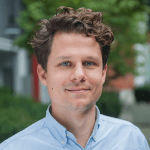
Dominic Hofstetter
Dominic Hofstetter is the Director of Capital and Investments at EIT Climate-KIC, Europe’s largest climate innovation initiative. He is responsible for building the organisation’s nascent investment function and has led the co-creation of Transformation Capital, a new investment logic at the intersection of systems thinking and finance practice designed to catalyse the transformation of place-based systems such as cities, landscapes, and transportation networks. Before joining EIT Climate-KIC in 2015, Dominic had worked as an entrepreneur at the renewable energy start-up Electrochaea, as a private equity investor at Hudson Sustainable Investments, and as a finance professional in the institutional asset management division of Credit Suisse. He holds an MBA from the University of Chicago Booth School of Business and an MSc from the Environmental Change Institute at the University of Oxford. Dominic regularly writes on climate change and systems innovation on Medium, and he can be found on Twitter and LinkedIn.
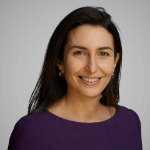
Silvia Bastante de Unverhau
Silvia Bastante de Unverhau is a global philanthropy expert, executive and senior advisor with over 20 years of experience working across the business, non-profit, international development, and government sectors. As Chief Philanthropy Officer for Co-Impact – a global philanthropic collaborative focused on equitable and inclusive impact at scale across the Global South – Silvia leads the organisation’s work with philanthropists and foundations, focusing on partnerships and strategy. Prior roles include Global Head of Philanthropy Advisory at UBS, and Associate Partner at Monitor Group. Early in her career, Silvia held management roles at the Organization of American States, the International Secretariat of Amnesty International, and the Office of the President of Peru. Silvia graduated from the London School of Economics and Harvard Kennedy School, and lives in Zurich with her family. Originally from Lima, Peru, she has visited and worked in over 70 countries across five continents.
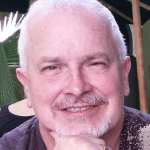
Steve Waddell
Steve Waddell Responding to the 21st century’s enormous global challenges and realising its unsurpassed opportunities require transformation in ways of acting and organising. For the past 35 years Steve has been supporting this through community organising, consultations, education, research, and personal leadership. This has included leadership with the world’s largest community-based credit union and the Global Finance Initiative. He is currently Lead Steward of Bounce Beyond, supporting initiatives developing a new, emerging economic paradigm.
Dozens of publications include the books Societal Learning and Change: Innovation with Multi-Stakeholder Strategies (2005); Global Action Networks: Creating our future together (2011); Change for the Audacious: a doers’ guide to large systems change for a flourishing future (2016). Steve has a Ph.D. in sociology and an MBA, and is a Canadian-American living in Boston with his husband.
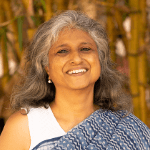
Neelam Chhiber
Neelam Chhiber is an Industrial Design graduate from NID, Ahmedabad. For the past three decades she has been working with artisans in rural areas, by providing design, technical, marketing and management solutions to bridge the urban-rural chasm. As Co-founder and managing trustee of Industree Foundation, Neelam guides the Foundation’s work to holistically tackle root causes of poverty by creating an ownership-based, organised creative manufacturing ecosystem for micro-entrepreneurs. Her most recent endeavour, Mission Creative Million, aims to strengthen the resources of a million producers by 2030, to achieve both economic impact (including regular work, increased wages and financial stability) and social impact (improved agency and voice for women at home and in their communities, as well as better educational for the next generation). She has been recognised numerous times for her work in the sector, including: 2011 Schwab Social Entrepreneur of the Year for India; L’Oreal Paris 2021 Femina Women Award in the Social Impact category; Womanity Foundation’s 2013 Women Change Makers Fellow and FKCCI Outstanding Women Entrepreneur for 2015.
Neelam is a member of India Design Council and the WEF Skills Task Force, India. She is a board member of AIACA (All India Artisans and Craftworkers Welfare Association) and member working committee of Civil Society Organisations at NITI Aayog. She is also an alumnus of Social Impact International, the Global Social Benefit Incubator, Santa Clara University, USA, the Harvard Executive Program, and a graduate of the Art and Science of Systems Change Program of the Harvard Kennedy School.
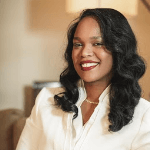
Dana François
Dana François is a program officer for the W.K. Kellogg Foundation in Battle Creek, Michigan. In this role, she works in the foundation’s priority place of Haiti to support thriving children, working families and equitable communities. François is responsible for identifying and nurturing positive, systemic change within communities, planning, designing and executing programming efforts to advance viable solutions for economic development for families and communities, aligned with the strategic programming functions of the overall foundation and implementing of national and micro regional strategy in Haiti.
Additionally, she provides leadership, oversight of the design and execution of complex community-driven multi-sectoral and private-public strategic partnerships and initiatives aiming at improving family economic security through entrepreneurship, ecosystem and value chain development, alternative financing, and capacity building. She also supports coalition-building, establishes, monitors and manages relationships, partnerships, collaborations and contacts with intermediaries, partners, consultants, community and legislative leaders.
She has contributed to numerous development efforts as the point person and liaison for Haiti-U.S. partnerships, programs; project design lead where she coordinated and collaborated on numerous research projects.
François is pursuing an MBA at Babson College and holds dual bachelor’s degree from the University of Massachusetts Boston in economics and political science. She is fluent in English, French and Haitian Creole. In her free time, she volunteers and rescues animals and is a staunch advocate for animal rights and veganism.
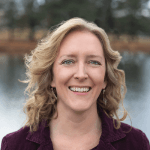
Suzanne Bowles
Suzanne Bowles is Chief Strategist of Cattail Strategy, a firm that advances systems change philanthropy, and a founding member of Catalyst 2030.
Suzanne brings together people and communities who seek transformation through connection and has spent decades supporting strategic and resource development for grassroots systems change organisations.
